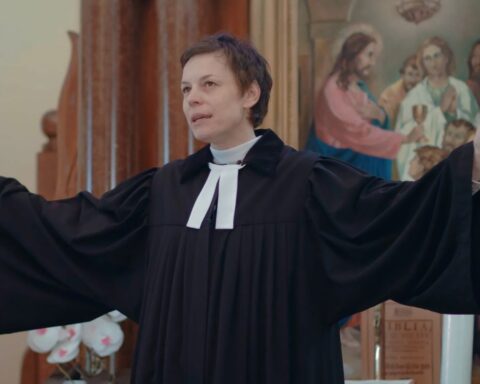Music icon Buffy Sainte-Marie faces serious allegations regarding her Indigenous identity. A bombshell exposé by CBC’s investigative documentary program The Fifth Estate aired Friday, along with a companion article by Geoff Leo, Roxanna Woloshyn and Linda Guerriero om CBC. The documentary, titled “Making an Icon,” alleges that Sainte-Marie is the latest person to be unmasked as a “pretendian,” or a non-Indigenous person posing as Indigenous for personal gain. Sainte-Marie has claimed to be Cree with roots in the Piapot First Nation in Saskatchewan. The singer’s narrative has long described a complicated sense of identity after being adopted by Albert and Winifred Santamaria of Massachusetts. However, the documentary presents considerable evidence that the Italian-American Santamarias are actually Buffy’s birth parents.
The singer’s birth certificate, which she always said was destroyed amid poor record-keeping practices that comprised the violence against Indigenous children, is presented to CBC by a registry in Massachusetts. The certificate identifies Buffy, born Beverly Jean, as the child of the Santamarias with the certificate further noting both parents as white, which was common practice in the area at the time. The document is one piece among a considerable body of evidence against Sainte-Marie’s claims.
Moreover, the documentary outlines a complicated history in which Sainte-Marie’s narrative shifted over time, gradually coalescing in later years, but displaying a trajectory consistent with other false narratives of Indigenous identity. Professor Kim Tallbear appears in the documentary and says that Buffy’s story began at a time when the hippie movement and American Indian movement were gaining traction in popular culture, and that Sainte-Marie’s status as Indigenous “greatly elevated her career and her visibility.”
The documentary alleges that Sainte-Marie fabricated her narrative while rising to fame as a folk icon in the 1960s’ and later in 1975 when she gave her career a second wind by appearing on the children’s television series Sesame Street. Her stint on Sesame Street proved a landmark for Indigenous representation in popular culture with Sainte-Marie frequently engaging children with stories about Cree culture and customs. Moreover, the CBC documentary positions Sainte-Marie as the most significant pretendian case yet given a 60-year-career defined not just by milestones and accolades, but by a passionate legacy of advocating for Indigenous rights. However, even interviewees who claim to be Buffy’s family members have allegedly long raised concerns that she was doing so at the expense of legitimate Indigenous voices.
Carry It On
“Making an Icon” indicates that concerns about Sainte-Marie’s claims surfaced following the airing of the 2022 documentary Buffy Sainte-Marie: Carrie It On. (The film was POV’s Fall 2022 cover story.) Directed by Madison Thomas, the film screened at virtually every Canadian film festival following its premiere at the Toronto International Film Festival in September with Saint-Marie’s legacy celebrated from coast to coast. It aired on Crave in Canada and on PBS in the USA, garnering an Emmy nomination in the process and winning two Canadian Screen Awards, including one for Thomas’s direction. But the account brought the story into the homes of fans and experts on Indigenous ancestry, who tell CBC that Sainte-Marie’s narrative had numerous red flags. Also among the charges in the CBC investigation is a history of litigious behaviour. Members of the Santamaria family present CBC with letters by Buffy’s lawyers in which the singer threatened legal action. In one case, her niece presents a hand-written letter by Buffy addressed to her brother, Alan, in which she raises allegations of sexual abuse that will surface if he continues to speak out about her ancestry claims. Those allegations of abuse form a key narrative in Buffy Sainte-Marie: Carry It On.
The documentary and investigation have rocked social media since they were released Friday. Saint-Marie arguably had a reputation as one of the most significant Indigenous artists in popular culture, due in equal measure to her music and her outspoken advocacy. She has received numerous accolades for her work including an Academy Award for Best Original Song in 1983 for “Up Where We Belong” from An Officer and a Gentleman. The feat is credited as the first Oscar win for an Indigenous person. She won the 2015 Polaris Prize for her album Fire in the Blood and is a three-time winner of the Juno for Indigenous Artist or Group. She was made an Officer of the Order of Canada in 1997 and was honoured with a commemorative stamp in 2021. However, Sainte-Marie was also blacklisted by more than one White House administration due to her advocacy for Indigenous rights in the 1960s and ’70s.
Singer Stands By Claims
Sainte-Marie released a statement on Friday in which she stood by her claims. She also addressed fans in an emotionally charged video that was posted to Facebook. “I am proud of my Indigenous-American identity, and the deep ties I have to Canada and my Piapot family,” the singer wrote. Sainte-Marie reiterated that she was adopted by Emile Piapot and Clare Starblanket Piapot “as a young adult” and noted a complicated relationship to identity and an inability to identify her birth parents. She also stood by the allegations of abuse. “This is my truth,” wrote Sainte-Marie. “And while there are many things I do not know; I have been proud to honestly share my story throughout my life.”
Additionally, members of the Piapot family claimed Buffy as one of their own. In a statement, they noted, “She is our Auntie, our relative, and a beloved member of the Piapot family and community.”
Carry It On director Madison Thomas also released a statement standing by Buffy’s story. The filmmaker questioned the necessity of the CBC story and asked Indigenous communities to uphold Buffy in the recognition of the ways in which she has held up others.











